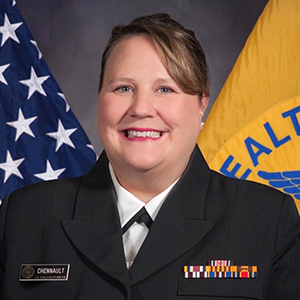Cynthia Chennault, RDH, BSDH, MPH

Commander (CDR) Cynthia Chennault is serving in the United States Public Health Service Commissioned Corps as an active-duty Health Services Officer and a Dental Hygienist. CDR Chennault graduated from Texas Woman’s University in 2008 and worked in the private sector for two years before accepting commission into the U.S. Public Health Service (USPHS).
In 2010, CDR Chennault’s first assignment was located in an isolated hardship location in Harlem, MT, working for Indian Health Services. In 2012, CDR Chennault became a community and clinical dental hygienist for the Catawba Indian Nation in Rock Hill, SC, where she authored numerous grants and established several oral health prevention programs within the tribal community.
For the past four years, CDR Chennault has worked for the Health Resources & Services Administration (HRSA) as a Senior Public Health Analyst in the Division of Medicine and Dentistry. In her current position, CDR Chennault provides national oversight of oral health training grants that support dentists, dental hygienists, and dental specialists in treating populations and individuals in underserved and rural communities across the United States.
CDR Chennault is actively engaged with numerous USPHS groups and committees which include the Dental Hygiene Professional Advisory Group, recently serving as immediate past Chair, the Health Service Professional Advisory Committee, serving as the social media team lead, the DC Commissioned Officers Association, serving on the recreation and networking committee and the social media committee, the USPHS Dinner with a Captain Committee, serving as the newsletter chair, and is an active member in the USPHS Music Choral Ensemble.
Title
Oral Health and Community Program Planning
Abstract
Oral health is a key indicator of overall health, well-being and quality of life. In order to determine how to improve oral health within a community, it is important to first obtain an evidence-based understanding of the community and its current health and oral health needs and existing resources.
Oral disease affects every community. It is the responsibility of public health agencies to assess the oral health needs of the communities they serve and develop programs and policies to ensure that those needs are met. Implementing health interventions is a crucial step in improving community health outcomes at the local, tribal, territorial, state, and national level. Addressing health in communities involves planning, by ensuring that the built environment—where people live, work, and play, also promotes health lifestyles.
By following the Health Promotion/Disease Prevention POARE model, public health agencies and dental team members will be able to clearly identify a problem of importance to the community they serve, make plans for the best use of resources, and plan a thorough evaluation of the program.
Page last updated 9:02 AM, February 7, 2024